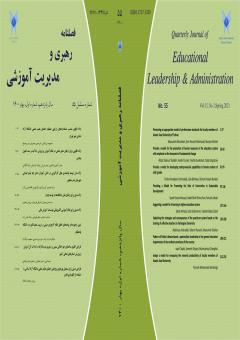A Grounded Theory-Based Conceptual Model for Applying the Metaverse in School Education
Subject Areas :mohammadreza farjzadeh 1 , elahe ahmadnia 2
1 - Graduated in Educational Management, University of Zanjan, Zanjan, Iran.
2 -
Keywords: Metaverse, School Education, Grounded Theory, Interactive Learning, Educational Transformation.,
Abstract :
Purpose: The aim of this study is to develop a conceptual model for the application of the Metaverse in Iranian school education. In light of the need to transform learning structures and utilize emerging technologies, this research seeks to propose a localized and theoretically grounded framework based on expert experiences and insights.
Method: This qualitative study employed a grounded theory approach. Data were collected through semi-structured interviews with 14 participants, including teachers, school administrators, and experts in educational technology and the Metaverse. Data analysis was conducted using Strauss and Corbin’s three-stage coding method (open, axial, and selective coding). To ensure the trustworthiness of the data, Lincoln and Guba’s criteria were applied. To ensure the validity (credibility) and reliability (dependability) of the data, Lincoln and Guba's criteria—including confirmability, transferability, dependability, and credibility—were employed. Strategies such as member checking, triangulation with credible sources, and peer debriefing were utilized.
Findings: The findings revealed 18 subcategories organized into five main dimensions: causal conditions, contextual conditions, intervening conditions, strategies, and consequences. These were integrated under the core category: "Transformation of the Learning Structure in School Settings through Experience-Based and Interactive Approaches in the Metaverse." Key concepts include experiential learning, self-regulation, realistic simulation, redefined teacher roles, and the development of digital identity.
Conclusion: The results indicate that the Metaverse can serve as a powerful platform for transforming school education, provided that intelligent policymaking, technological infrastructure, and teacher preparation are enhanced. The proposed conceptual model offers a practical framework for designing educational systems compatible with the future digital learning ecosystem.
حسینی، م.، علوی، ف.، و قنبری، ر. (۱۴۰۱). تحلیل چالشها و فرصتهای فناوری متاورس در آموزش عمومی. فصلنامه مطالعات نوین در آموزش و فناوری اطلاعات، ۸(۲)، ۳۵-۵۰.
حنیفی ع.، عبدالهی م.، و حبیبی ش. (1404). اعتبارسنجی الگوی متاورس در آموزش علوم مدارس متوسط دوره اول. نشریه پژوهش و نوآوری در تربیت و توسعه،13 (1): 95-107.
عباسی, حامد, زارعی زوارکی, اسماعیل و نیلی احمدآبادی, محمدرضا . (1403). بررسی کاربرد فناوری نوین متاورس در آموزش و یادگیری: یک مرور نظاممند. فناوری آموزش, 18(2), 287-310.
فتحی هفشجانی, فرشیده . (1403). طراحی الگوی کارایی متاورس در پرورش دانشآموزان پژوهنده. پژوهش و نوآوری در آموزش ابتدایی, 6(2), 70-49.
فروزانمهر، ز.، و قاسمزاده، ل. (۱۴۰۴). طراحی مدل فناورانه آموزش متاورسی در مدارس ایران: رویکرد کیفی مبتنی بر گروه کانونی. فصلنامه علوم تربیتی نوین، ۸(۴)، ۱۰۳–۱۲۶.
یعقوبینژاد، ع. و محمدی، ن. (۱۴۰۲). امکانسنجی استفاده از متاورس در آموزش و پرورش ایران. مجله راهبردهای فناوری آموزشی، ۱۰(۱)، ۲۳–۴۰.
Bond, M. (2020). Schools and emergency remote education during the COVID-19 pandemic: A living rapid systematic review. Asian Journal of Distance Education, 15(1), 191–247.
Jee, Y. S., & Lim, Y. (2022). Metaverse-based experiential learning approach: Application in primary education. Journal of Educational Technology, 39(4), 45–60.
Kovalenko, N., Ivanova, T., & Novikova, I. (2022). Application of augmented and virtual reality in secondary education: The conceptual framework. Education and Information Technologies, 27(4), 5129–5148.
Lee, L.-H., Braud, T., Zhou, P., Wang, L., Xu, D., Lin, Z., ... & Hui, P. (2021). All one needs to know about metaverse: A complete survey. arXiv preprint arXiv:2110.05352.
Lin, C.-H., Lee, C.-Y., & Chen, M.-P. (2022). Opportunities and challenges of the metaverse in education: A systematic review. Interactive Learning Environments. Advance online publication.
Mystakidis, S. (2022). Metaverse. Encyclopedia, 2(1), 486–497.
Wang, F., Li, J., & Zhang, D. (2022). Designing hybrid classrooms in the era of the metaverse: Real-time synchronization of physical and virtual interactions. Computers & Education: Artificial Intelligence, 3, 100076.


